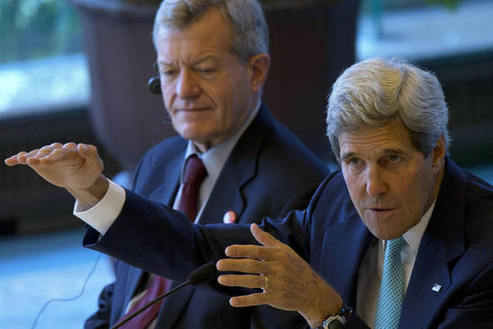Dialogue Mechanism Leads to New Sino-U.S. Relations
At the opening ceremony of the sixth round of S&ED State Councilor Yang Jiechi underscored the importance of jointly constructing the new relationship, treating one another with sincerity and respect, understanding each other’s strategic intentions and avoiding strategic misjudgment. He called for both parties to stand firm and persist in their efforts.
Secretary of State John Kerry said in his speech that the U.S. is committed to constructing a relationship of reciprocity and mutual benefit with China, promoting common interests through cooperation and constructively addressing their differences. The U.S. does not believe that conflicts are inevitable between the two countries.
Such affirmative remarks from both China and the U.S. are encouraging, but the shadow of suspicion still lurks between the two countries. Judgments of one another’s strategic intentions have direct influence on their policies and the path of bilateral ties. During the dialogue Mr. Kerry reiterated that the U.S. does not seek to contain China. “We may differ on one issue or another, but when we make that difference, do not interpret it as an overall strategy. It is a difference of a particular choice,” he told the audience.
Strategic Security
At the July dialogue Yang Jiechi and John Kerry discussed five major issues – constructing a new type of major power relationship between China and the U.S., deepening pragmatic cooperation, properly managing differences, promoting positive interactions in the Asia-Pacific, and jointly responding to major global and regional affairs.
|
 |
|
U.S. Secretary of State John Kerry attends the sixth round of S&ED in Beijing on July 9, 2014. |
Mr. Yang expected the S&ED to play a better role as an “accelerator” for China-U.S cooperation and “buffer” for their contentions, contributing to sustained, healthy and stable development of bilateral ties. But when it serves as the accelerator and when as the buffer depends on the nature of the particular issue the two countries face.
There are tangible divergences between the two countries concerning core issues such as sovereignty disputes and regional security, over which clashing interests make it difficult to reach consensus. Currently the most prominent of these are the disputes over the islands and waters in the East China Sea and the South China Sea, Internet security, and protection of commercial interests.
Some media take progress in these hot issues as the yarstick in judging the success of China-U.S. dialogue, giving the wrong impression that disagreement over these few issues would derail the China-U.S. relationship. Based on this logic, some critics even claimed that China-U.S. ties are at their lowest level since 1979. This opinion is shallow and trivial.
In his speech at the sixth round of S&ED President Xi Jinping urged the two countries to respect each other, seek common ground to resolve differences, and avoid being confused by an event or upset by a remark. He compared them to veteran fishermen, sitting firmly on the deck with composure despite gales and waves.
